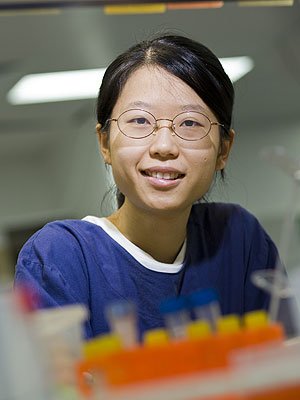
Researchers at The University of Queensland have developed a way to deliver drugs which can specifically shut down cancer-causing genes in tumour cells while sparing normal healthy tissues.
They are currently looking at cervical cancer. While cervical cancer vaccines – co-developed by Professor Ian Frazer at UQ – are reducing the chances of infection with the virus that causes the cancer, many thousands of women worldwide are likely to contract cervical cancer in the next few decades.
Fresh Scientist Ms Sherry Wu hopes the new technique, which involves the use of coatings rich in fats, will hasten the application of RNA interference or gene-silencing, a technology which can inactivate individual genes.
Using this technology, she and her colleagues observed a 70% reduction in tumour size in a cervical cancer mouse model.
“The traditional ways of packaging these drugs into suitable carriers are often complex and labour-intensive. The resulting products are also unstable at room temperature which is obviously not ideal for their clinical use,” says Ms Wu, a doctoral student at the UQ Diamantina Institute for Cancer, Immunology and Metabolic Medicine and one of the 2009 Fresh Scientists.
Until now, she says, treatment of cancer has relied mainly on surgery, radiotherapy or chemotherapy. Though these strategies have benefited millions of cancer patients to date, the lack of tumour specificity of some of these agents often make patients feel sick or result in significant hair loss.
RNA interference, a Nobel-prize winning technology discovered in late 90s, may be a way to solve this problem. It allows highly-specific silencing of cancer-causing genes in tumour cells.
But there are problems to solve before its use can be realized in clinics. These gene-silencing drugs are hard to deliver due to their instability as well as the lack of means for their efficient cell entry.
“In order to deliver these gene-silencing drugs safely and efficiently into tumour tissues in the body, we have to package them in lipid-rich carriers,” Ms Wu said.
The packaging method developed jointed by Ms Wu and Dr Lisa Putral shows promise in bringing the technology to clinics. The two researchers have been assisted by Dr Nigel Davies, an expert in drug delivery.
“We are excited about our findings and we are currently investigating the feasibility of combining this gene-silencing technology with low dose chemotherapeutic agents in cancer treatments,” says Associate Professor Nigel McMillan, of the Diamantina Institute, who supervised the work.
With cancer currently affecting more than 20 million people worldwide, the researchers believe that this latest development has made RNAi therapy for cancer treatment one step closer to reality.
“We are also currently looking into its potential use in other forms of cancer,” Dr McMillan said.
Sherry Wu is one of 15 early-career scientists presenting their research to the public for the first time thanks to Fresh Science, a national program sponsored by the Federal Government.
Media: For further information, contact Sherry Wu on 0427 743 779, or s.wu2@uq.edu.au and Nigel McMillan on 0413 730 894, n.mcmillan@uq.edu.au.
For Fresh Science contact: Sarah Brooker on 0413 332 489 and Niall Byrne on 0417 131 977 or niall@freshscience.org.
Note: The research was conducted with the support of National Health and Medical Research Council (NHMRC) project grant 401678.
Background information:
RNA interference is a naturally-occurring mechanism for gene regulation and it has been established that the introduction of short double-stranded RNA molecules into cells can efficiently trigger this mechanism thereby permitting their use as pharmacological agents. These RNA molecules are termed small interfering RNA or siRNA. Once inside the cell, they can induce efficient sequence-specific silencing of target genes.
To date, numerous siRNA targets have been identified in various disease models ranging from cancer, to infectious or neurodegenerative diseases. There are also several siRNA molecules currently being investigated in clinical trials for the local treatments of Age-related Macular Degeneration (AMD) or respiratory tract infections.
Despite these successes, the lack of suitable delivery carriers for these siRNA molecules has been the major obstacle for their systemic applications. The research team, led by A/Prof Nigel McMillan at the University of Queensland’s Diamantina Institute, has been working on solving this problem by packaging these molecules in lipid-rich vesicles.
They have demonstrated that this packaging process allows protection of siRNA molecules from enzyme degradation and also facilitate their delivery to tumours after systemic administration. Their newly developed formulation procedure also ensures product stability, a feature that is vital for the translation of RNAi technology from the laboratory to clinic.
The team uses cervical cancer as the model system to test the delivery efficiency of these lipid-entrapped siRNA molecules. They use siRNA to target two essential viral cancer-causing genes, E6 and E7, in cervical cancer cells. Given that the cervical cancer vaccines, Gardasil and Cervarix, will not decrease the number of new cases for another 15-20 years, this development will be beneficial for current and future sufferers of the disease.
Further details at www.freshscience.org.au
.jpg)

